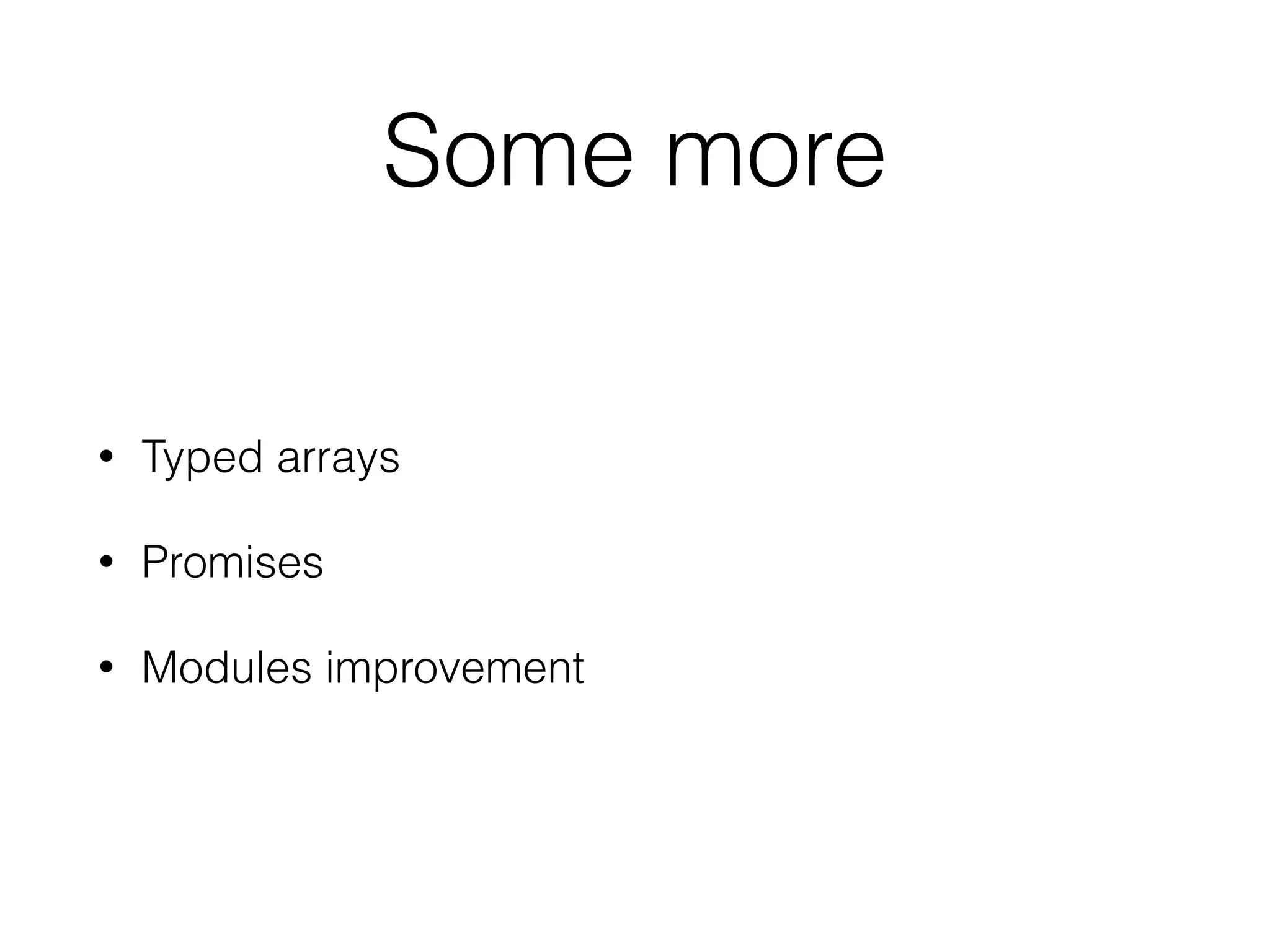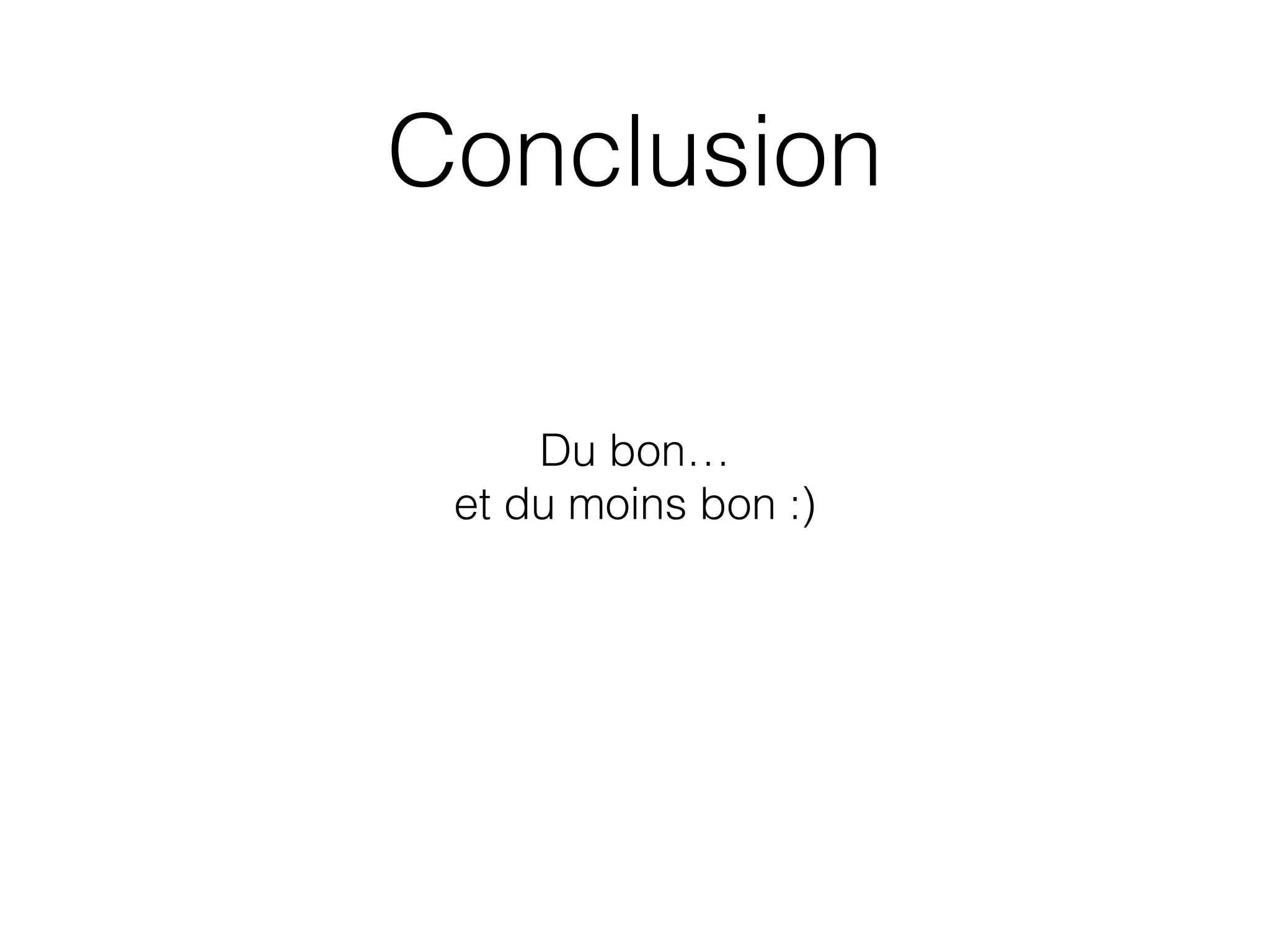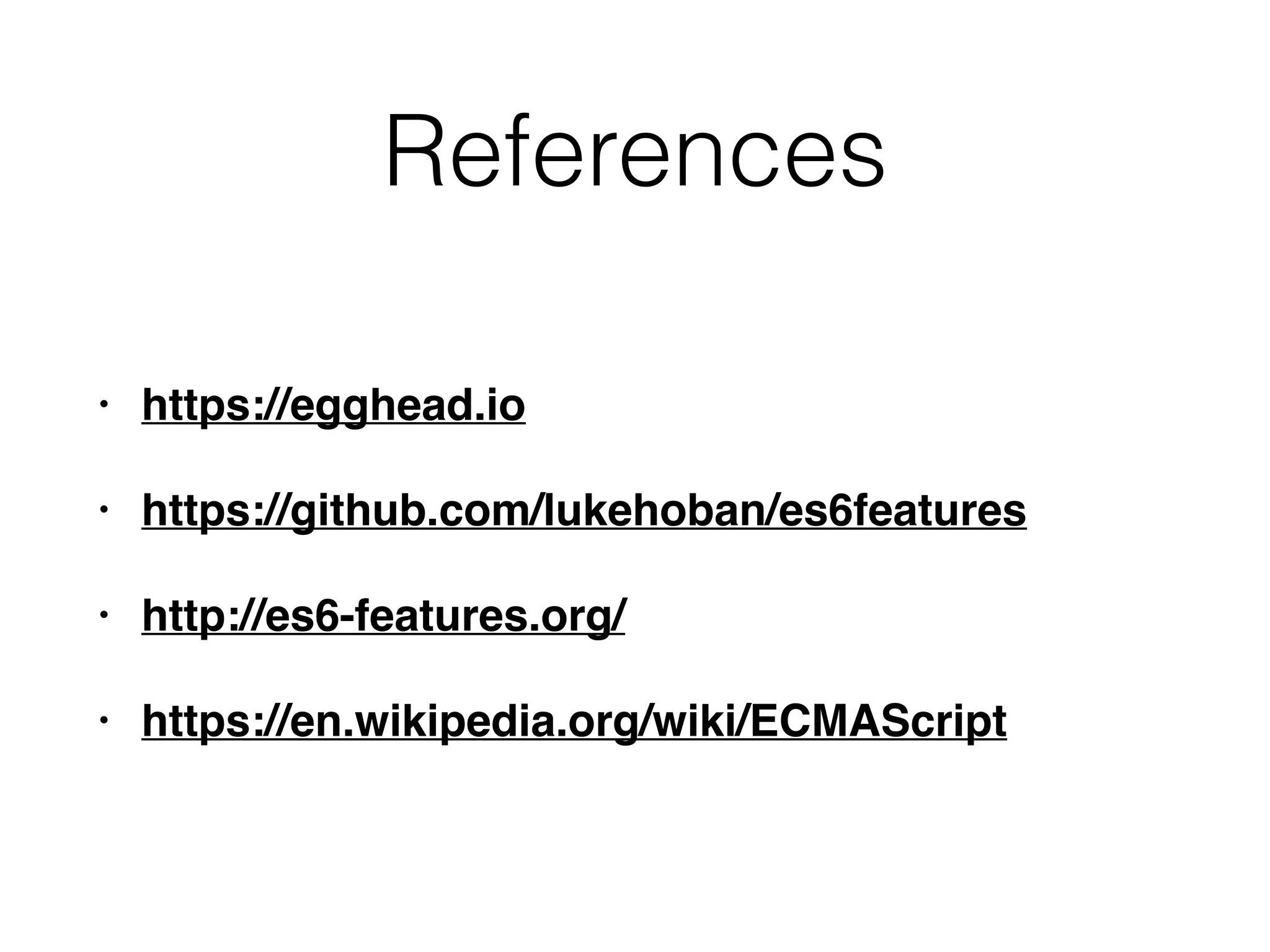The document summarizes the key features of ECMAScript 6 (ES6), the 2015 version of JavaScript. Some of the major additions covered include let and const for block scoping, arrow functions, template strings, enhanced object properties, the spread operator, destructuring assignments, classes and inheritance, generators, and proxies. ES6 aims to make JavaScript a more robust and feature-rich programming language.
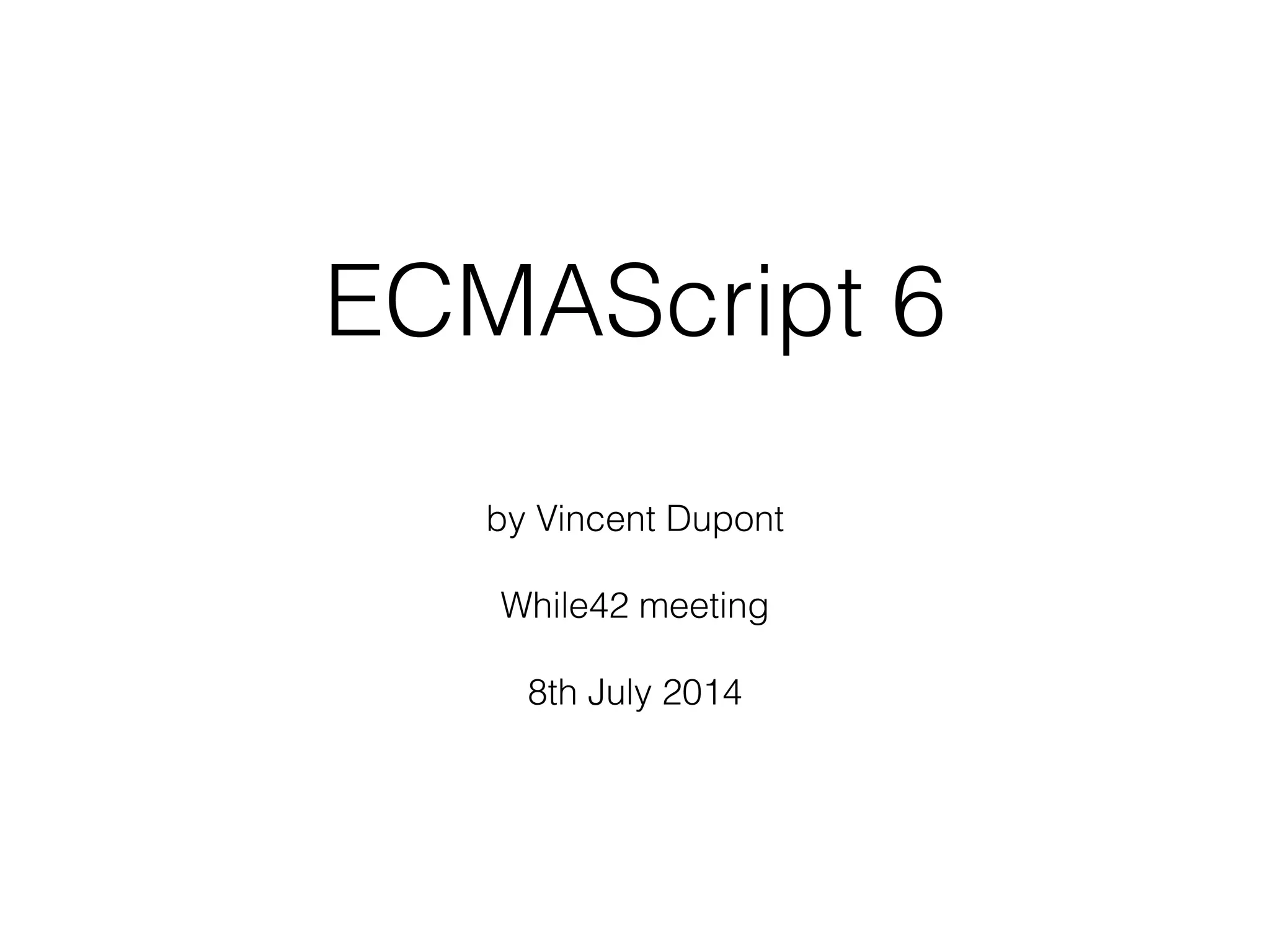
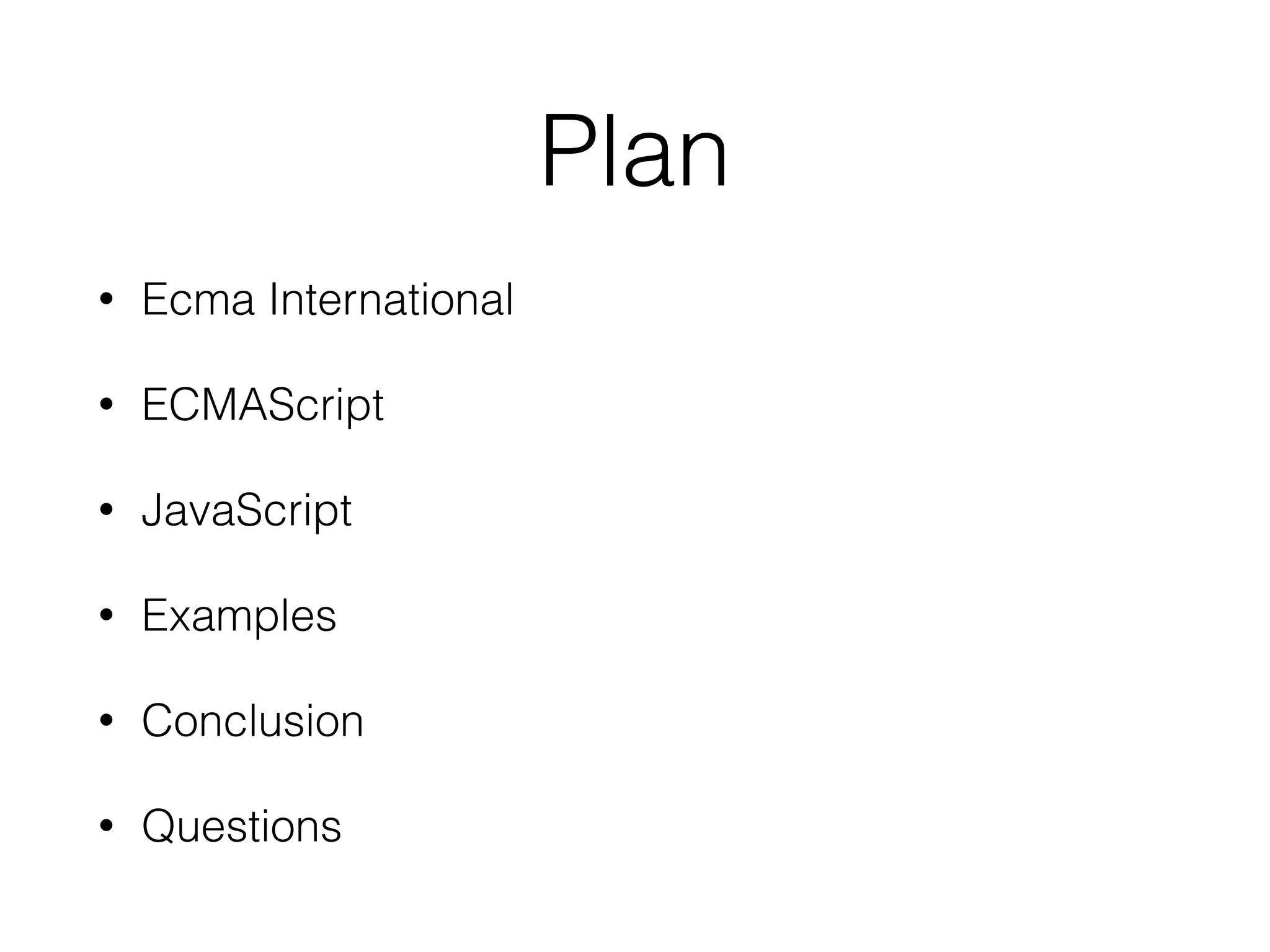

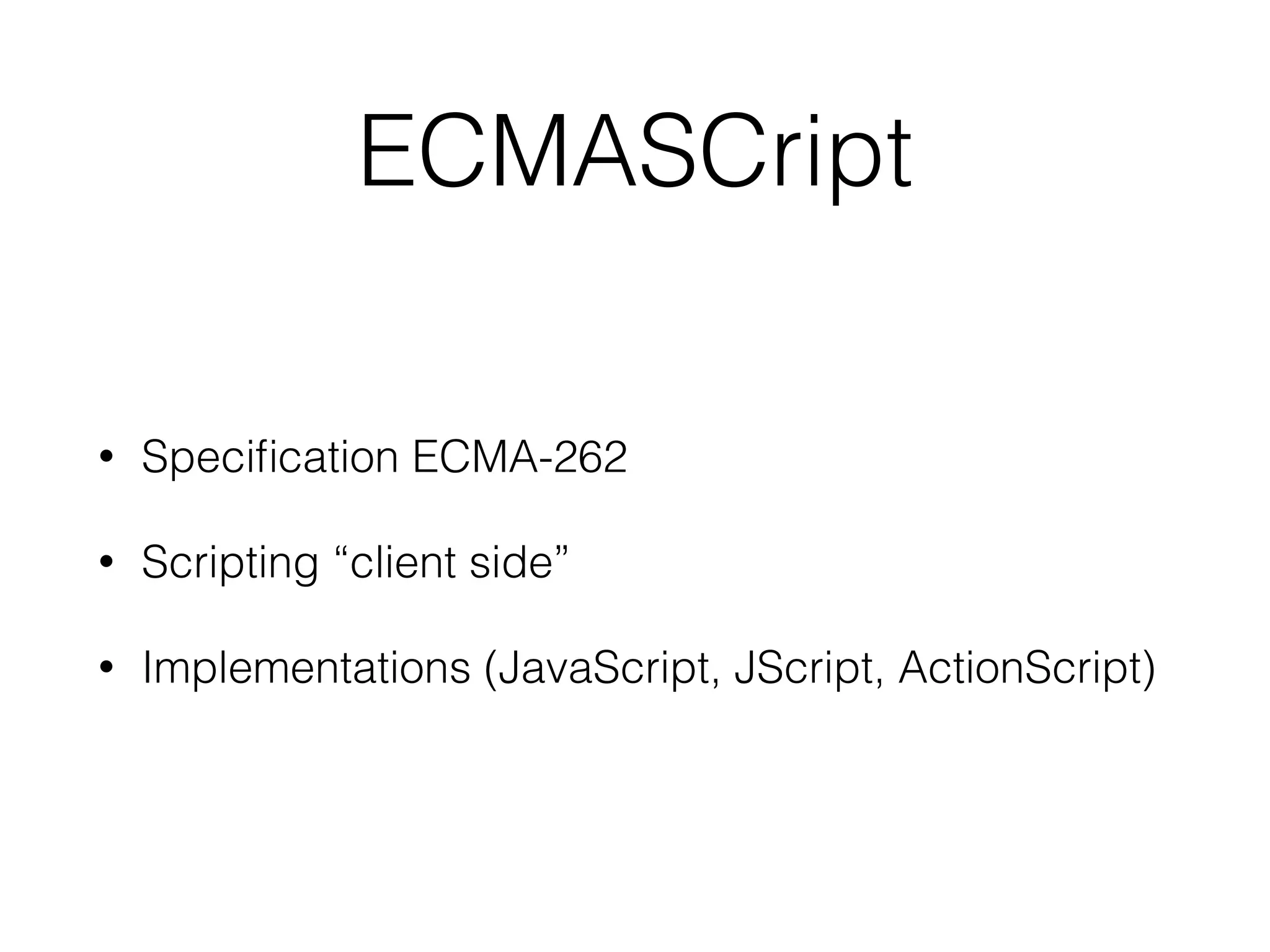
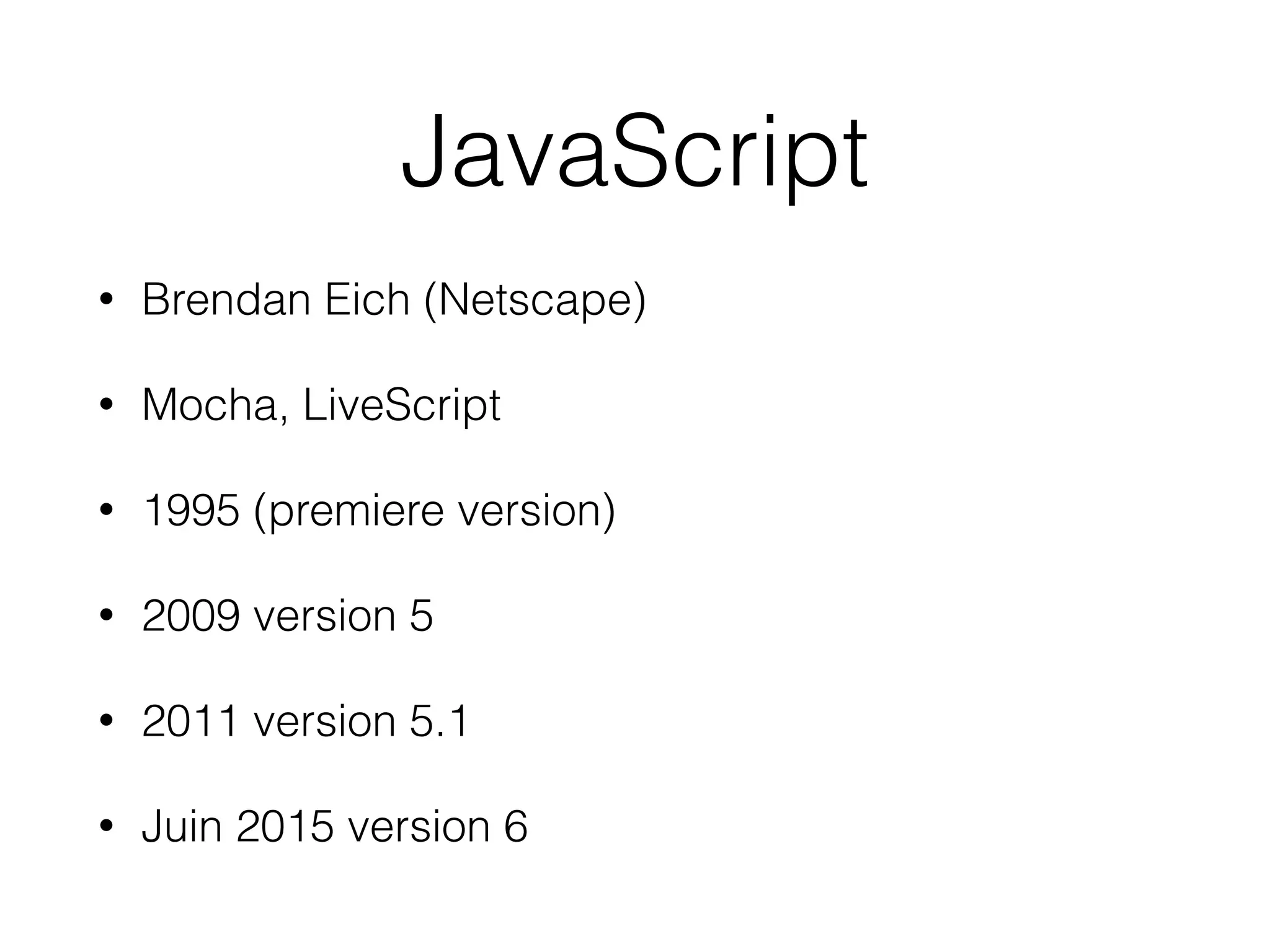
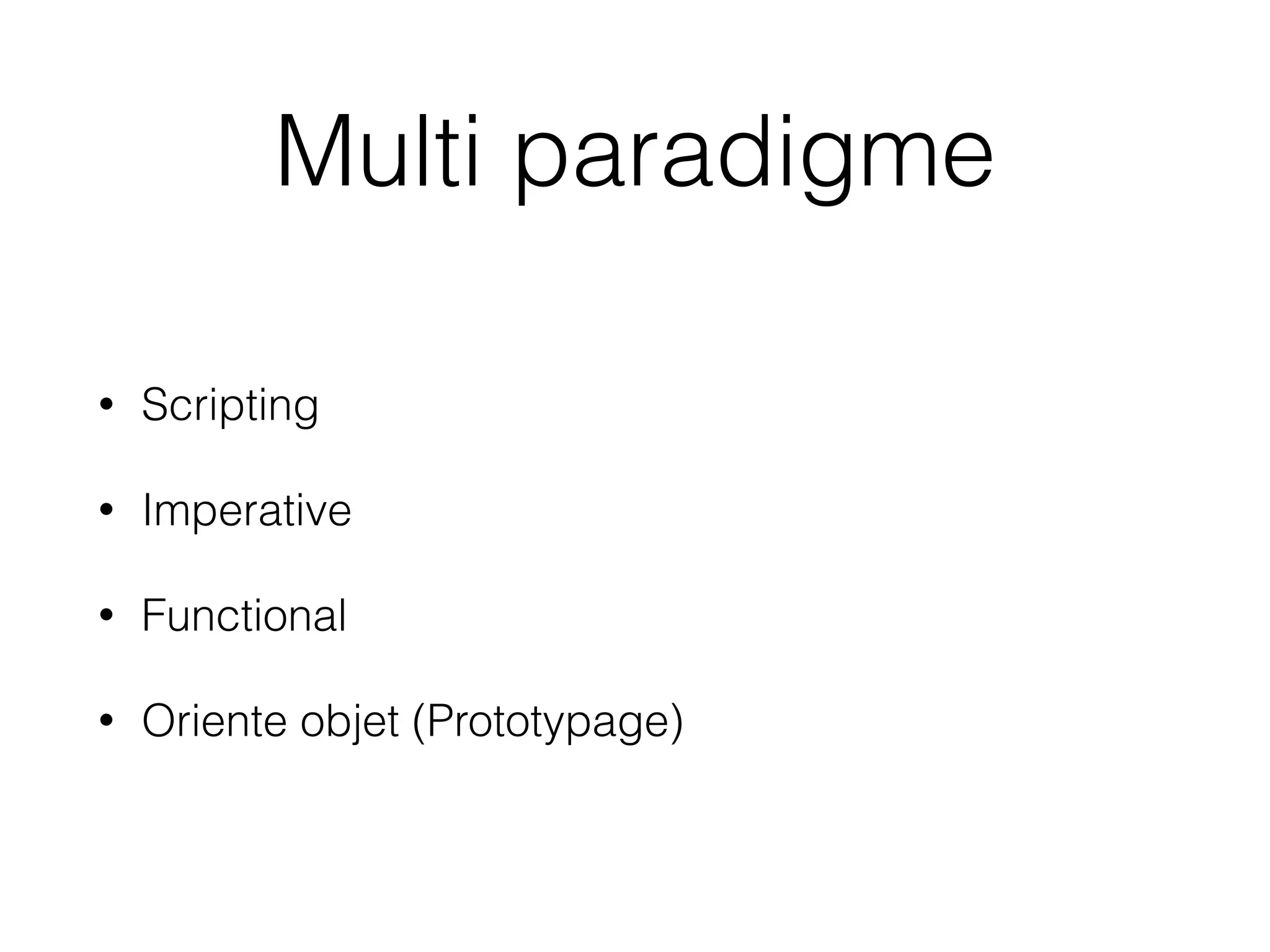
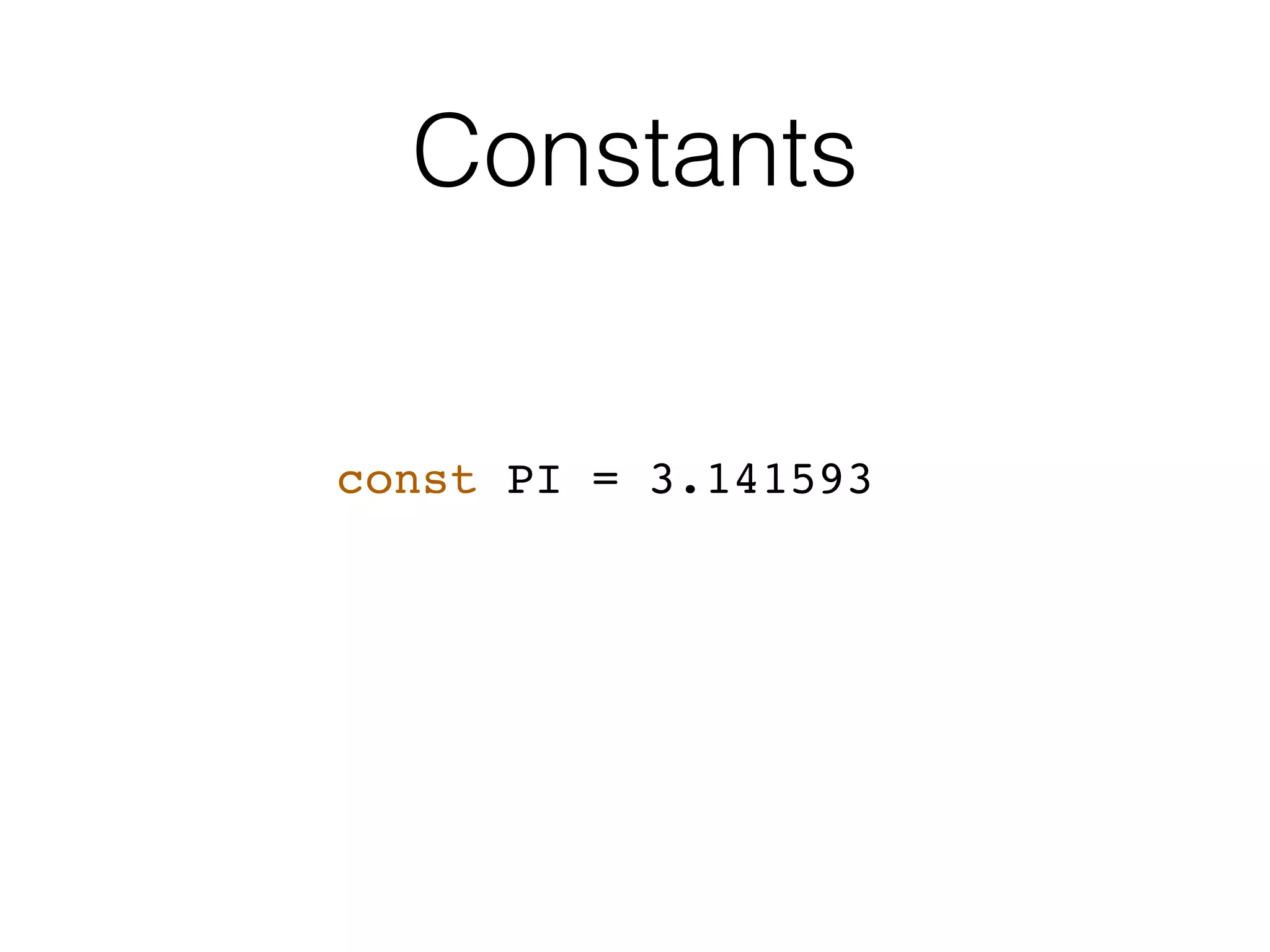
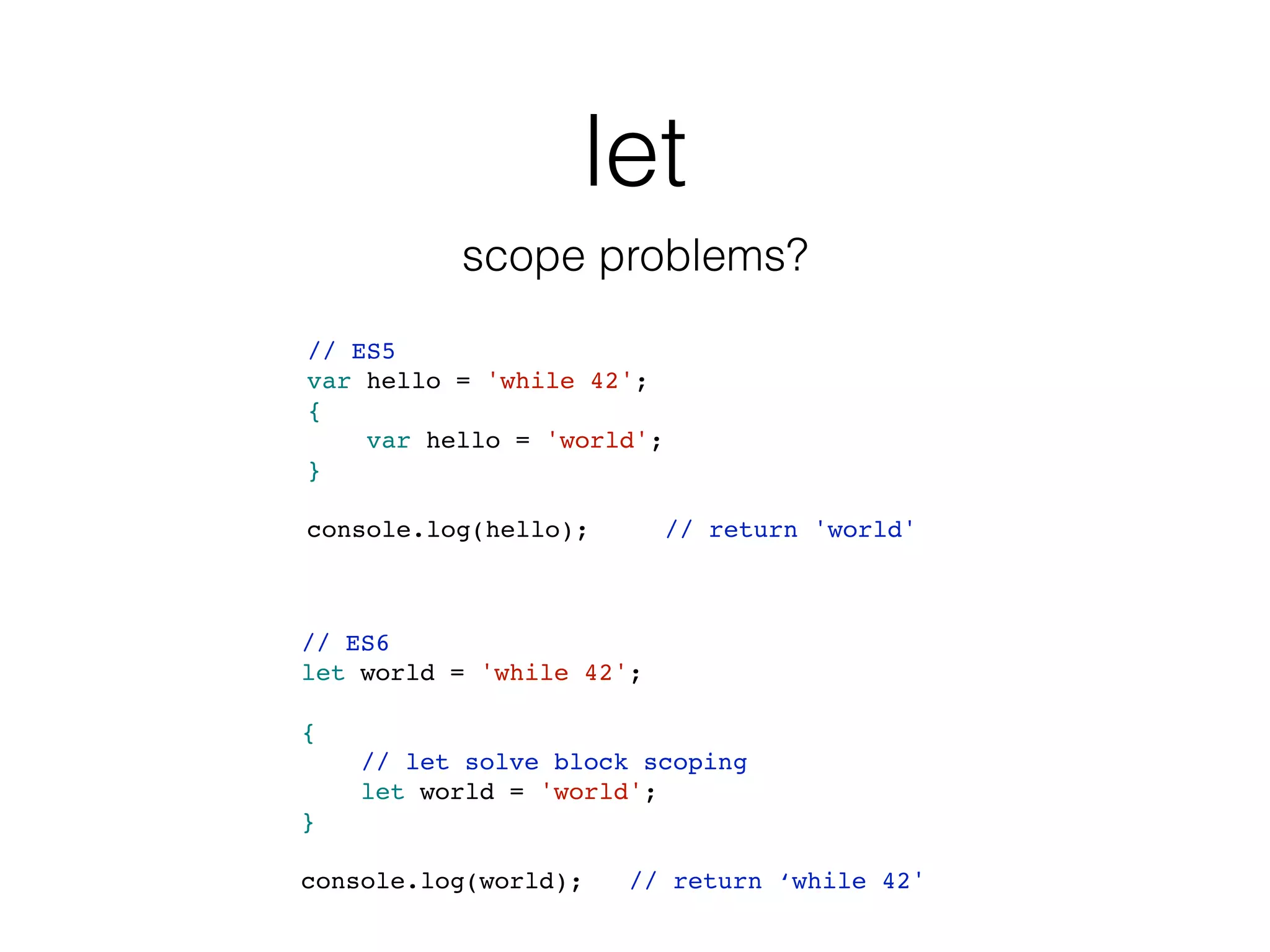
![// ES5
var fs = [];
for (var i = 0; i < 5; i++) {
fs.push(function() {
console.log(i);
})
}
fs.forEach(function(f) {
f(); // return 5
});
// ES6
fs = [];
for (let j = 0; j < 5; j++) {
fs.push(function() {
console.log(j);
})
}
fs.forEach(function(f) {
f(); // return 0 to 4
});](https://image.slidesharecdn.com/ecmascript6-150714080757-lva1-app6891/75/ECMAScript-6-new-features-9-2048.jpg)
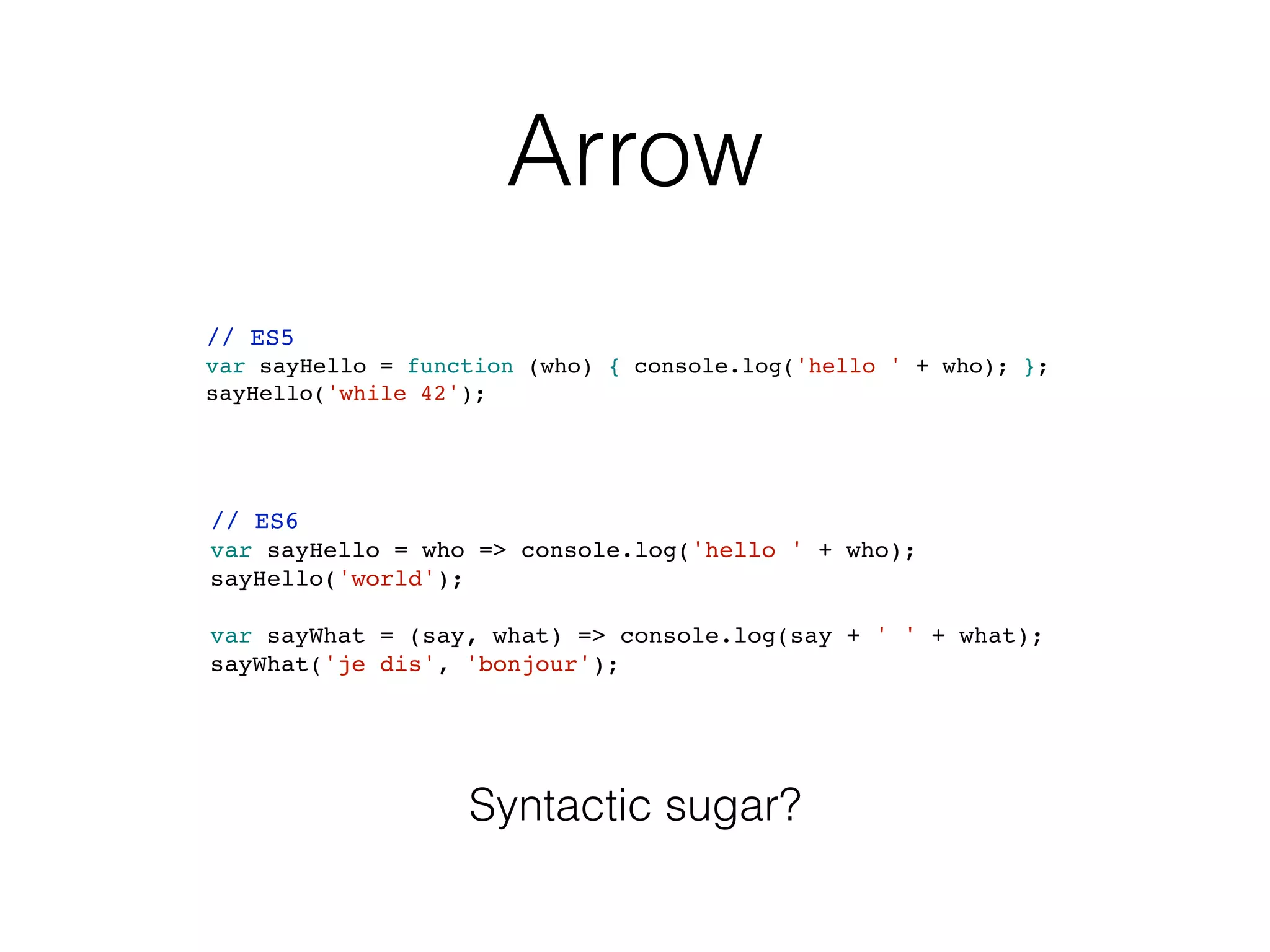
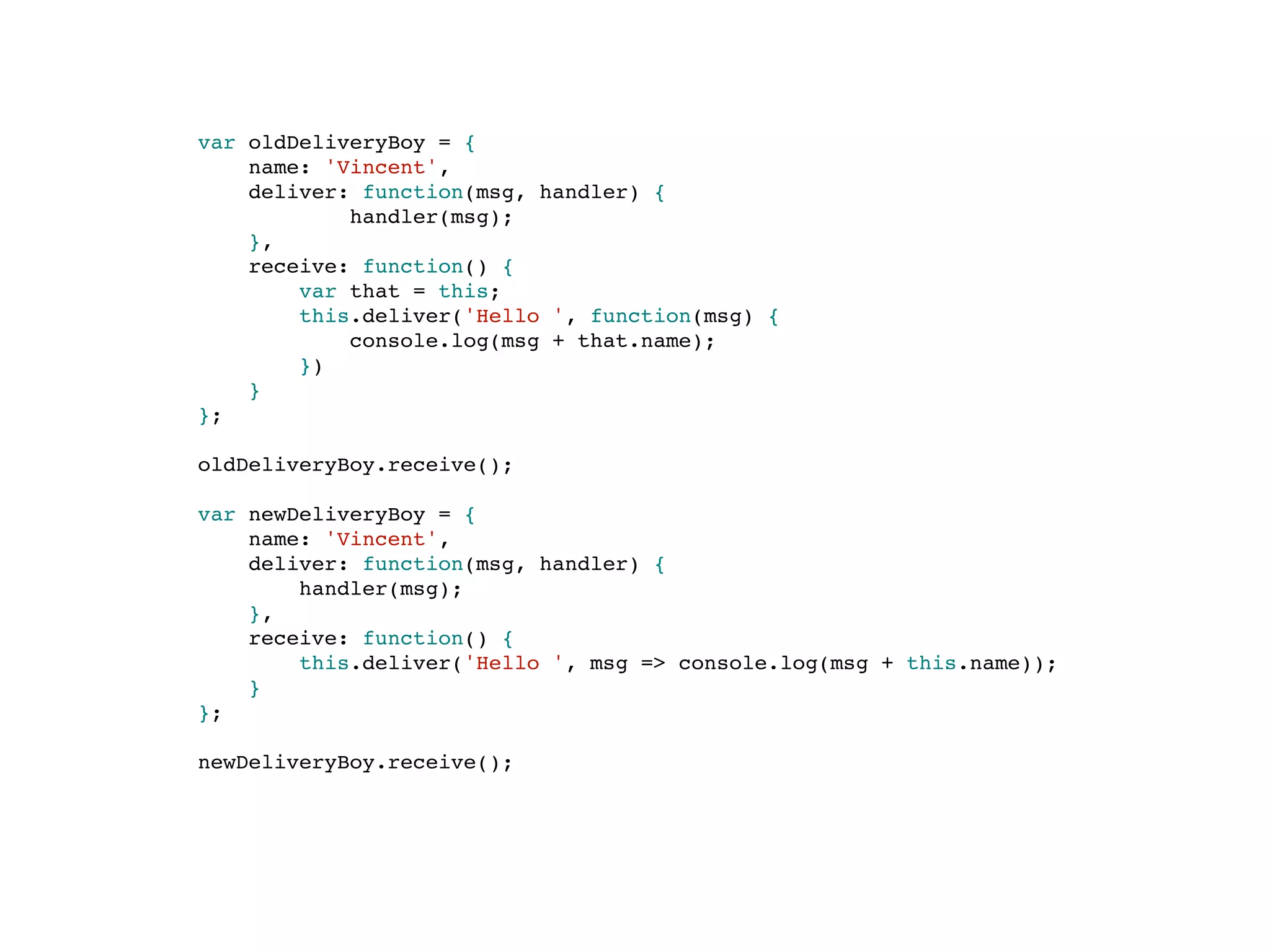
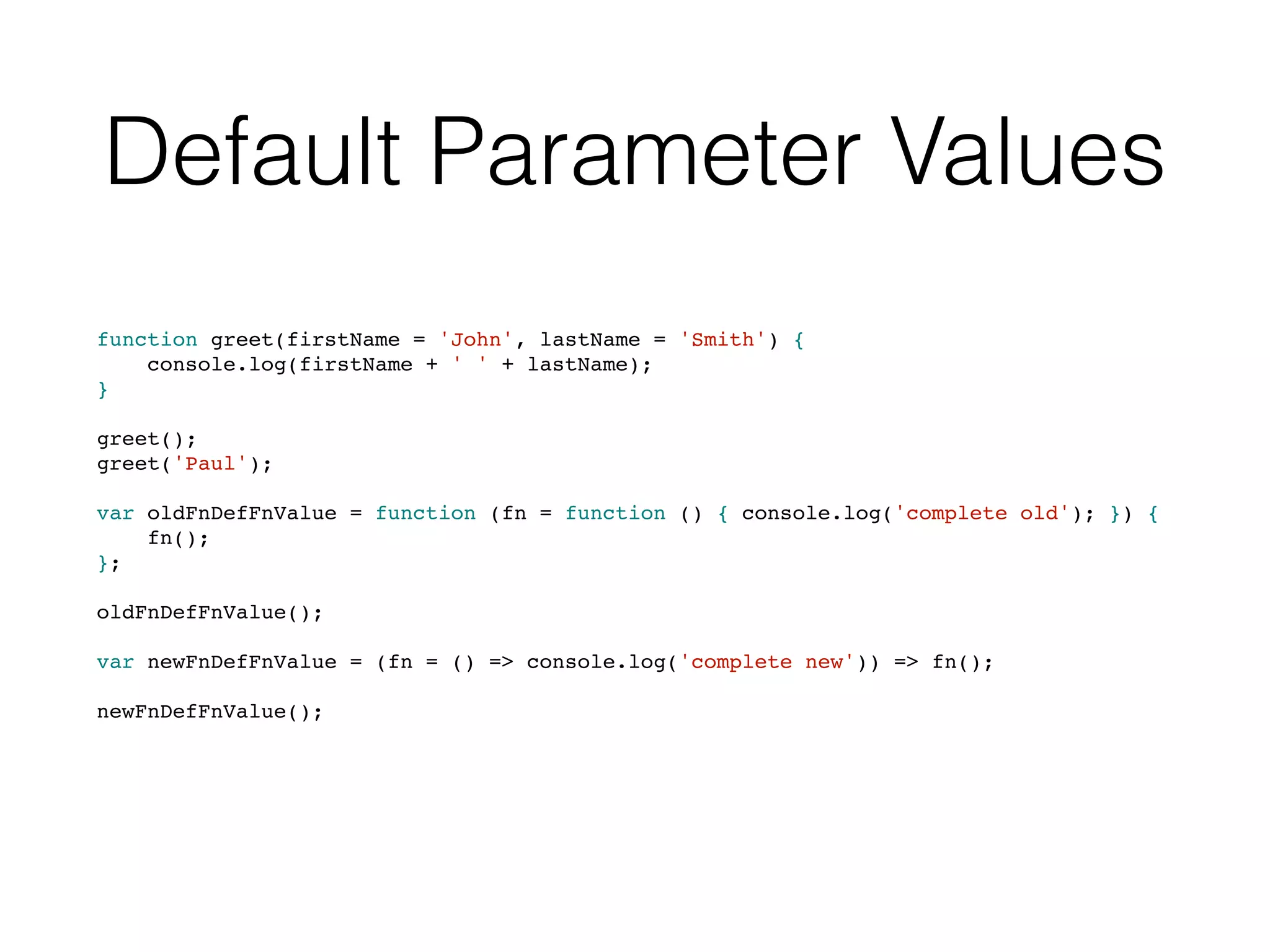
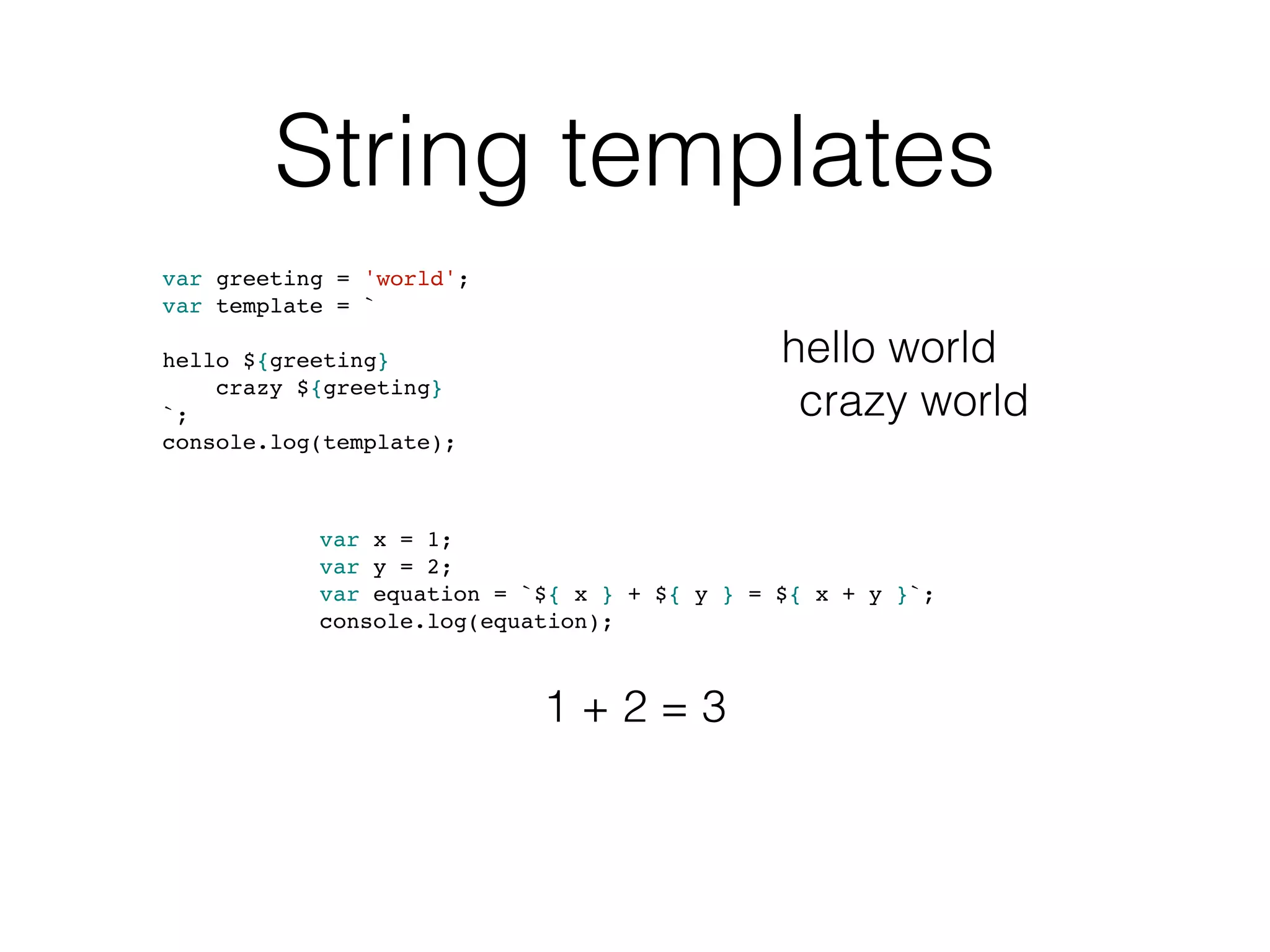
![var parseString = (strings, ...values) => {
console.log(strings);
console.log(values);
if (values[0] < 20) {
values[1] = 'awake';
} else {
values[1] = 'sleeping';
}
return `${strings[0]}${values[0]}${strings[1]}${values[1]}`
};
var templateResult = parseString`It's ${new Date().getHours()}, I'm ${""}`;
console.log(templateResult);
[ 'It's ', ', I'm ', '' ]
[ 21, '' ]
It's 21, I'm sleeping](https://image.slidesharecdn.com/ecmascript6-150714080757-lva1-app6891/75/ECMAScript-6-new-features-14-2048.jpg)
![Enhanced object properties
var color = 'red';
var speed = 100;
function go() {
console.log('vroom');
}
var action = 'start';
var car = {
color,
speed,
go,
horn() {
console.log('honk honk');
},
[action]: function () {
console.log('start');
}
}; // same as : var car = {color: color, speed: speed};
console.log(car.color); // return red
console.log(car.speed); // return 100
car.go(); // return vroom
car.horn(); // return honk honk
car.start(); // return start](https://image.slidesharecdn.com/ecmascript6-150714080757-lva1-app6891/75/ECMAScript-6-new-features-15-2048.jpg)
![Spread operator
console.log([1, 2, 3]); // return [1, 2, 3]
console.log(...[1, 2, 3]); // return 1 2 3
let first = [1, 2, 3];
let second = [4, 5, 6];
first.push(second);
console.log(first); // return [1, 2, 3, [4, 5, 6]]
first = [1, 2, 3];
second = [4, 5, 6];
first.push(...second);
console.log(first); // return [1, 2, 3, 4, 5, 6]
function addThreeThings(a, b, c) {
return a + b + c;
}
console.log(addThreeThings(...first)); // return 6](https://image.slidesharecdn.com/ecmascript6-150714080757-lva1-app6891/75/ECMAScript-6-new-features-16-2048.jpg)
![Destructuring assignment
var {firstName, lastName} = { // could also receive a function returning an object
firstName: 'vincent',
lastName: 'dupont'
};
console.log(firstName);
console.log(lastName);
var {firstName: prenom, lastName: nom} = { // could also receive a function returning an object
firstName: 'vincent',
lastName: 'dupont'
};
console.log(prenom);
console.log(nom);
var [one,,,last] = [1, 2, 3, 4];
console.log(one); // return 1
console.log(last); // return 4](https://image.slidesharecdn.com/ecmascript6-150714080757-lva1-app6891/75/ECMAScript-6-new-features-17-2048.jpg)
![var beatles = [
{firstName: 'John', lastName: 'Lennon'},
{firstName: 'Paul', lastName: 'McCartney'},
{firstName: 'Ringo', lastName: 'Starr'},
{firstName: 'Georges', lastName: 'Harrison'}
];
beatles.forEach(({firstName}) => console.log(firstName));
function logLastName({lastName}) { console.log(lastName); }
var [, paul] = beatles;
logLastName(paul); // return McCartney](https://image.slidesharecdn.com/ecmascript6-150714080757-lva1-app6891/75/ECMAScript-6-new-features-18-2048.jpg)
![Array comprehension
var nums = [1, 2, 3, 4, 5];
var aboveTwo = [num for(num of nums) if(num > 2)];
console.log(aboveTwo); // return [3, 4, 5]](https://image.slidesharecdn.com/ecmascript6-150714080757-lva1-app6891/75/ECMAScript-6-new-features-19-2048.jpg)
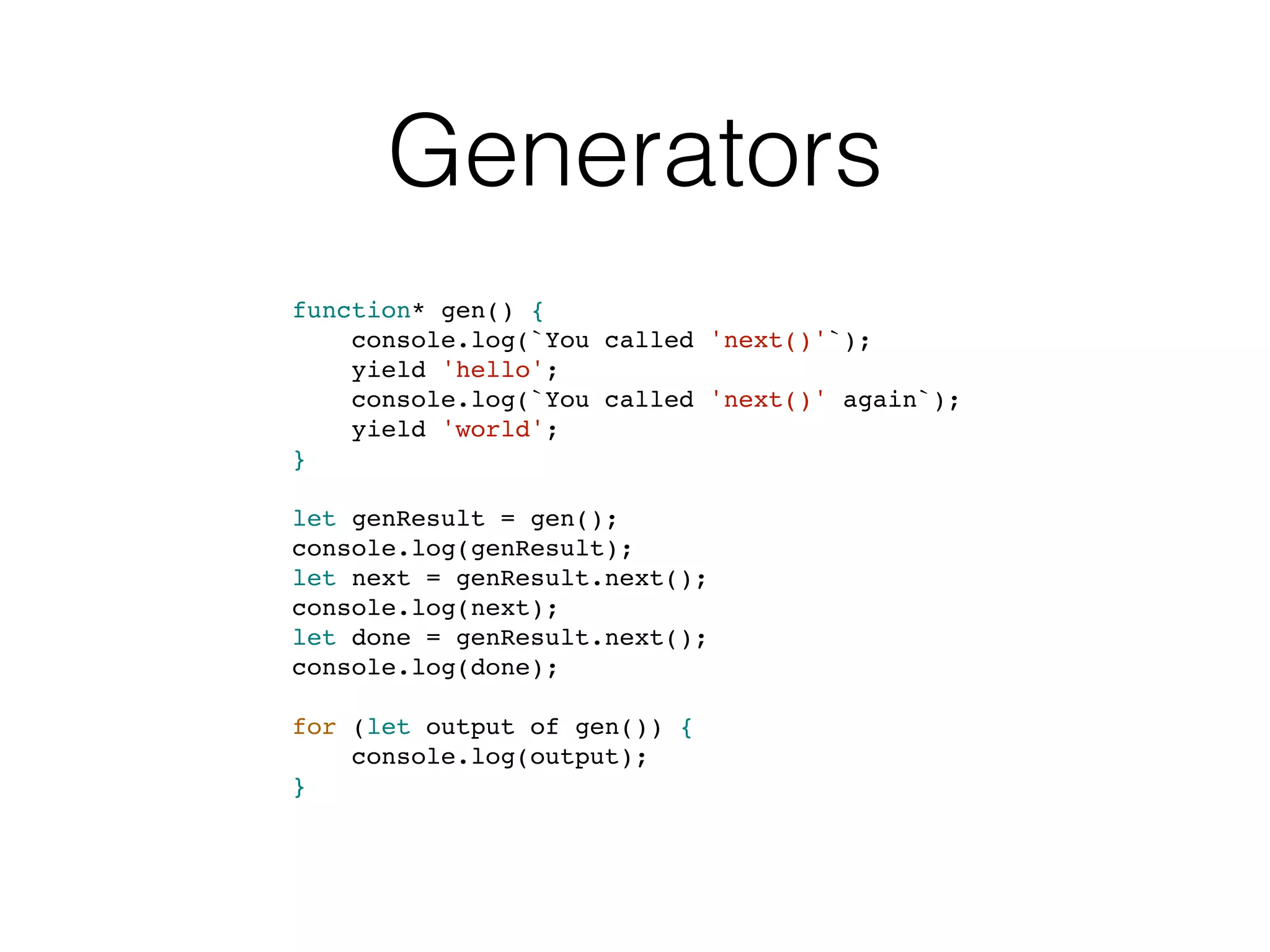
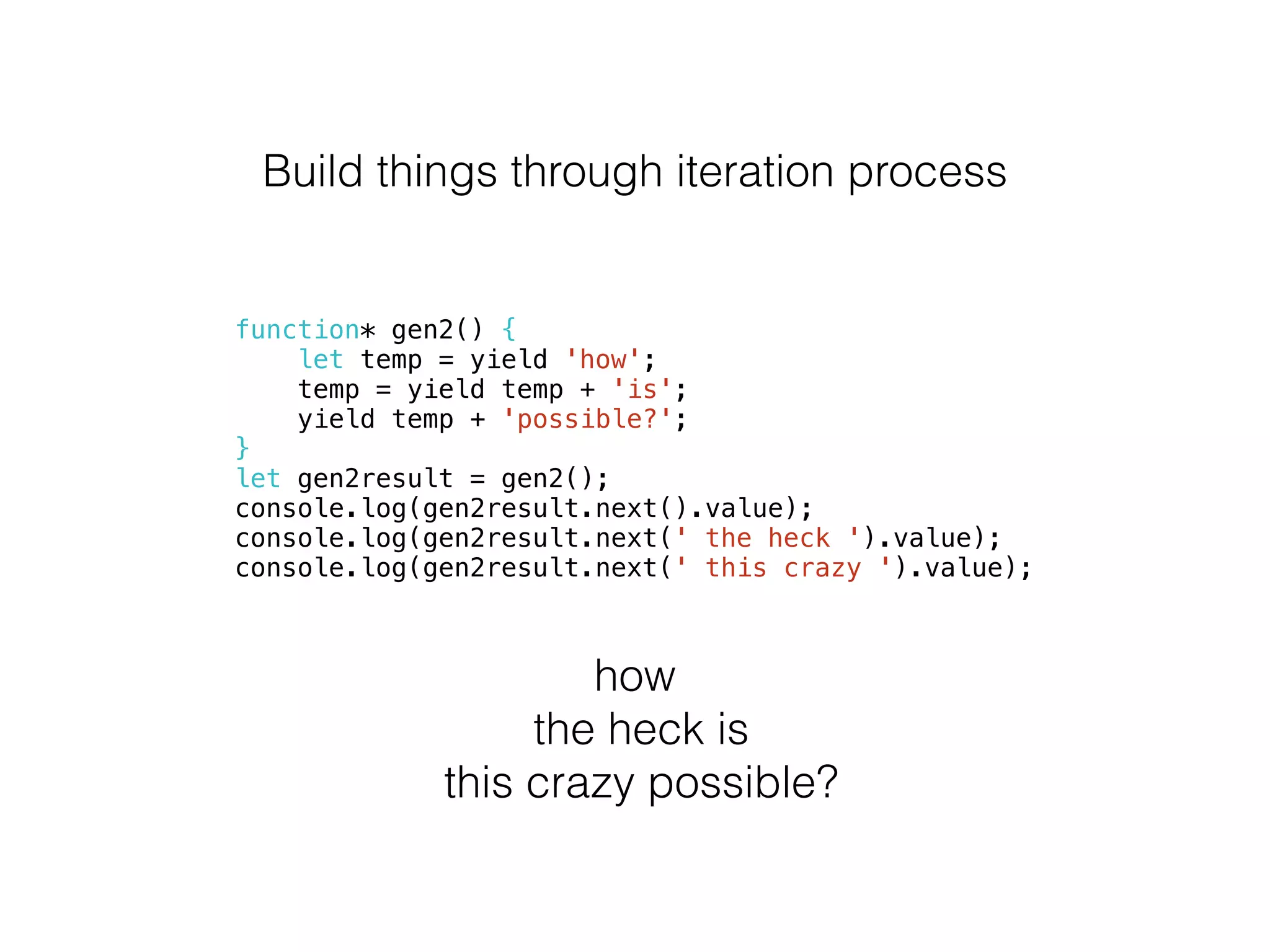
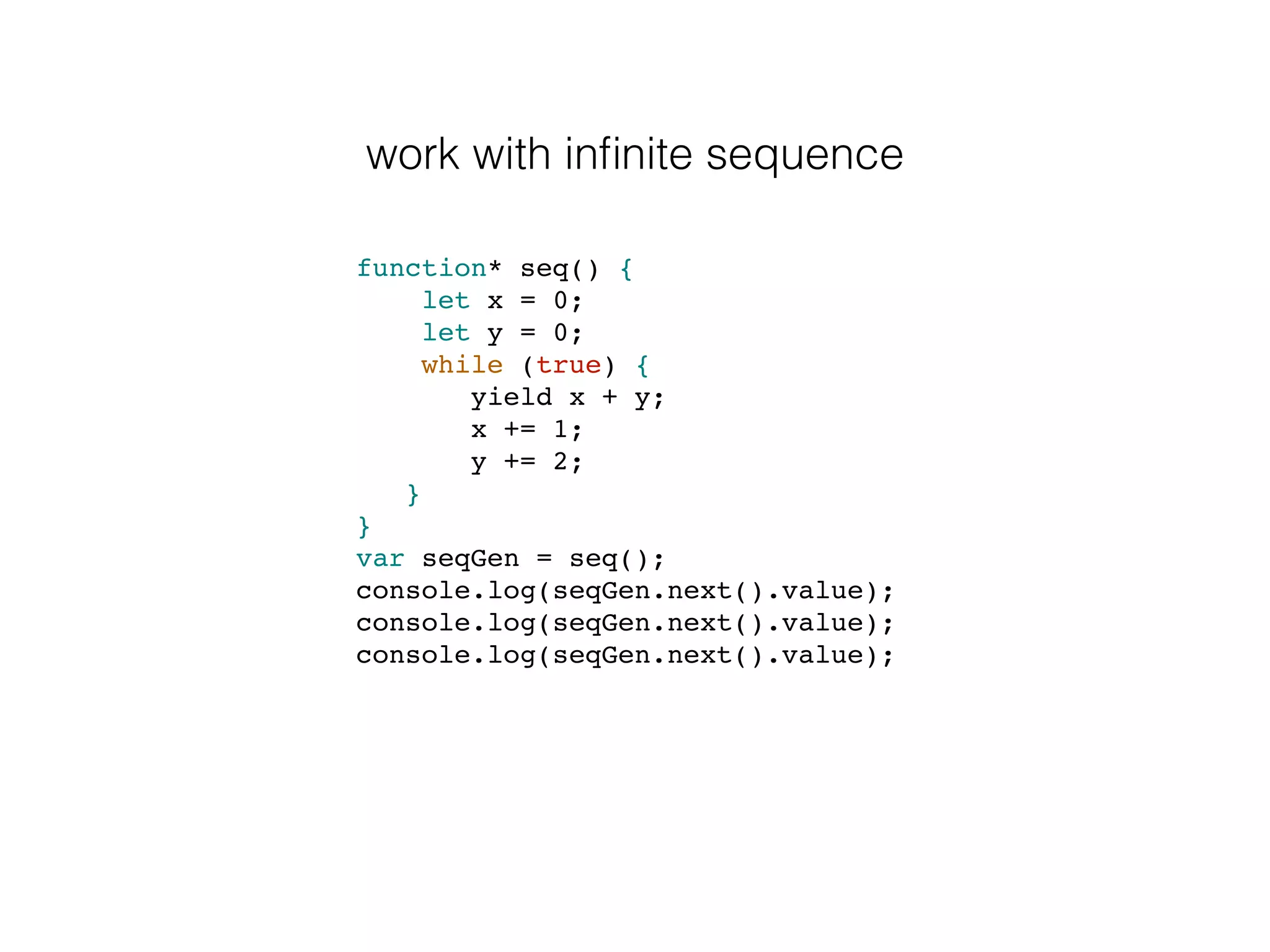
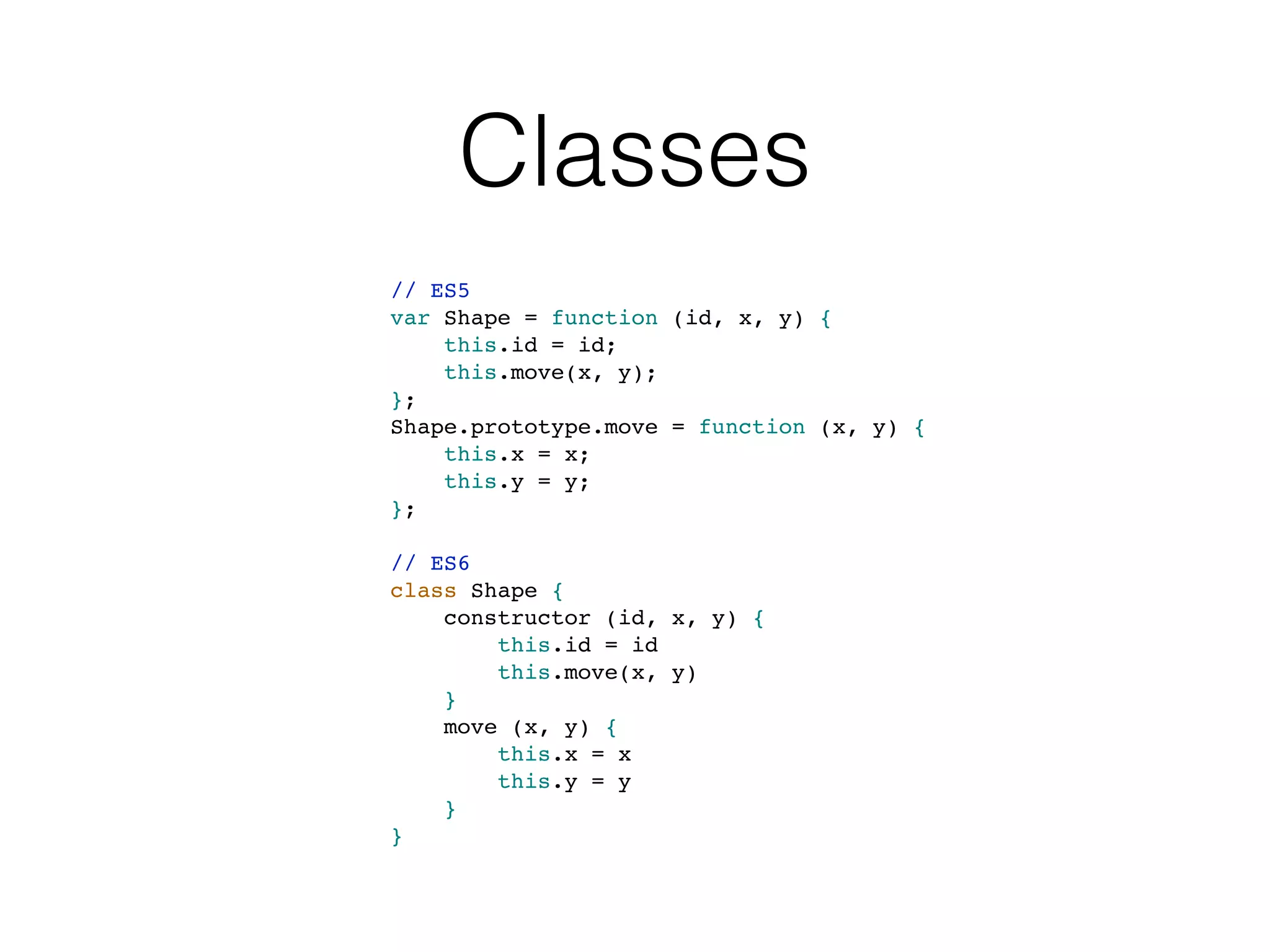
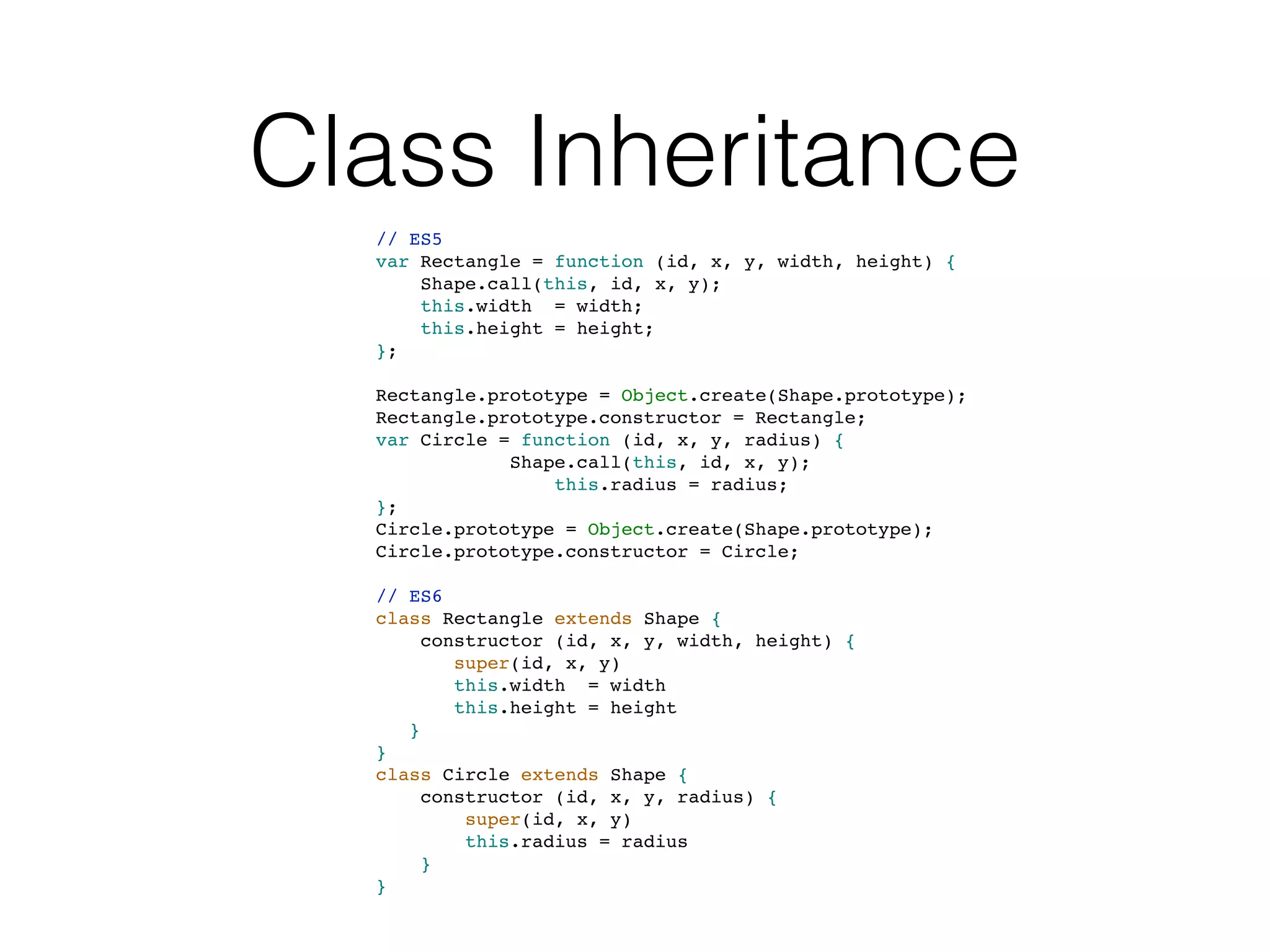
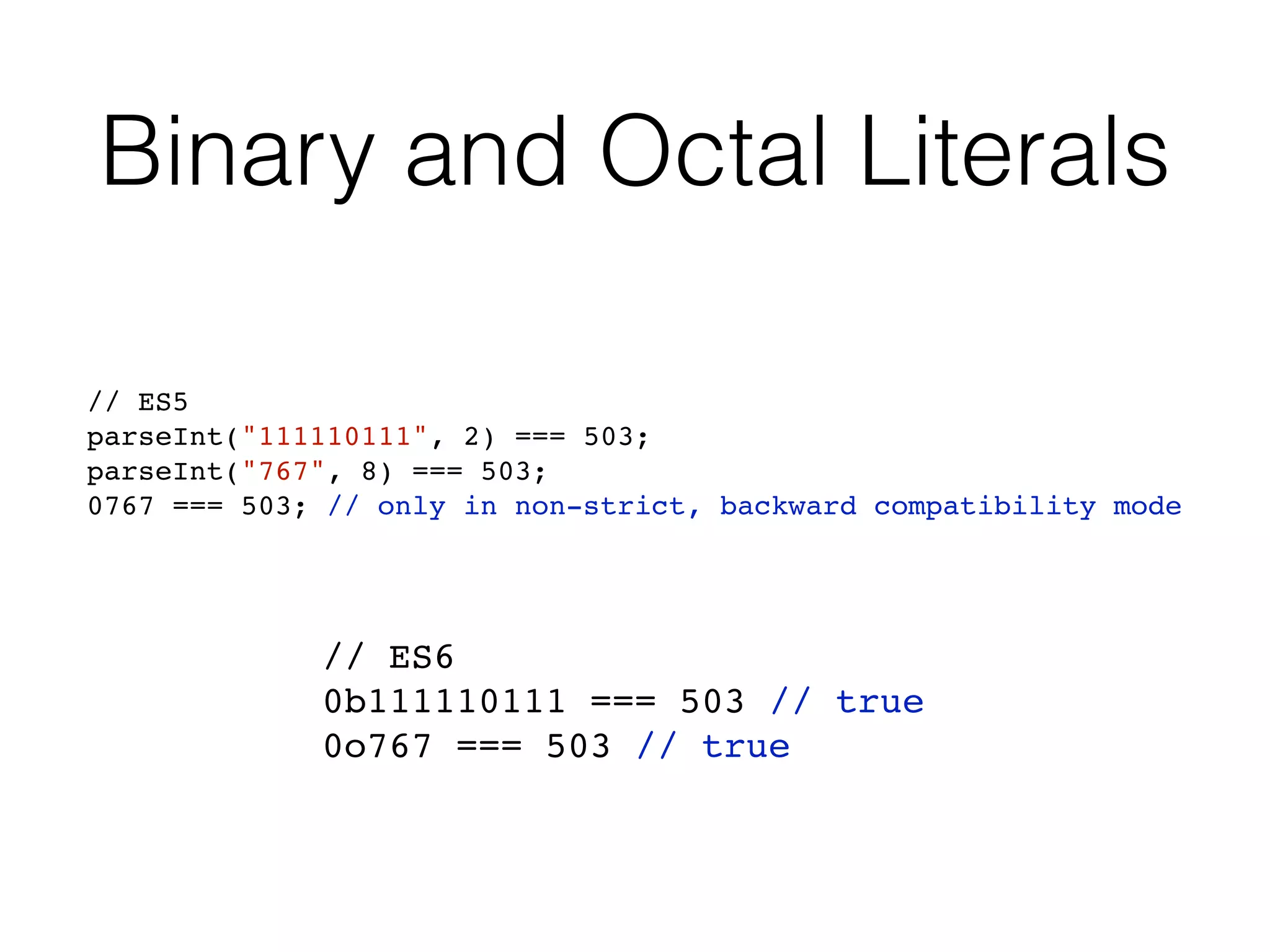
![Meta-Programming
let target = {
foo: "Welcome, foo"
}
let proxy = new Proxy(target, {
get (receiver, name) {
return name in receiver ? receiver[name] : `Hello, ${name}`
}
})
proxy.foo === "Welcome, foo"
proxy.world === "Hello, world"
Proxy
let obj = { a: 1 }
Object.defineProperty(obj, "b", { value: 2 })
obj[Symbol("c")] = 3
Reflect.ownKeys(obj) // [ "a", "b", Symbol(c) ]
Reflection](https://image.slidesharecdn.com/ecmascript6-150714080757-lva1-app6891/75/ECMAScript-6-new-features-26-2048.jpg)
